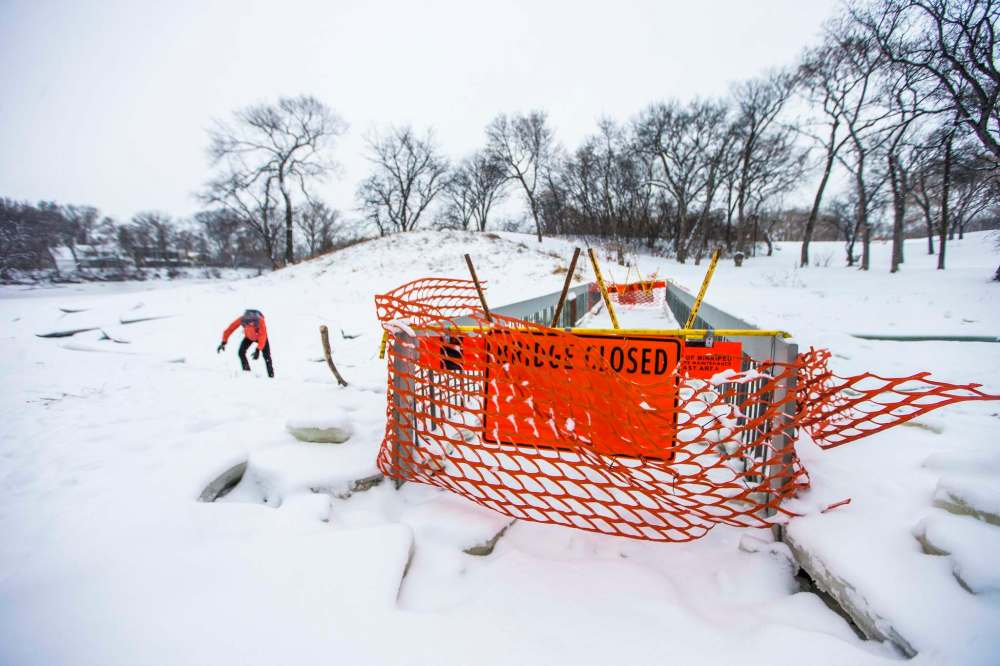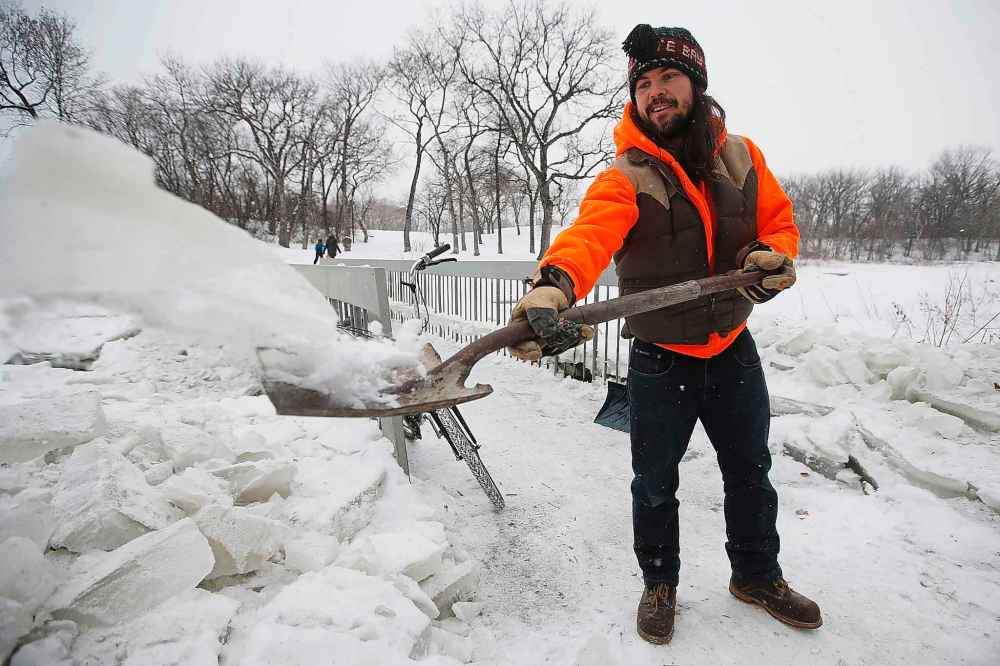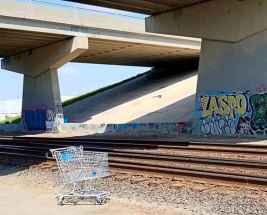When frustration leads citizens to act Why is the city so slow to deal with some issues?
Read this article for free:
or
Already have an account? Log in here »
To continue reading, please subscribe:
Monthly Digital Subscription
$0 for the first 4 weeks*
- Enjoy unlimited reading on winnipegfreepress.com
- Read the E-Edition, our digital replica newspaper
- Access News Break, our award-winning app
- Play interactive puzzles
*No charge for 4 weeks then price increases to the regular rate of $19.00 plus GST every four weeks. Offer available to new and qualified returning subscribers only. Cancel any time.
Monthly Digital Subscription
$4.75/week*
- Enjoy unlimited reading on winnipegfreepress.com
- Read the E-Edition, our digital replica newspaper
- Access News Break, our award-winning app
- Play interactive puzzles
*Billed as $19 plus GST every four weeks. Cancel any time.
To continue reading, please subscribe:
Add Free Press access to your Brandon Sun subscription for only an additional
$1 for the first 4 weeks*
*Your next subscription payment will increase by $1.00 and you will be charged $16.99 plus GST for four weeks. After four weeks, your payment will increase to $23.99 plus GST every four weeks.
Read unlimited articles for free today:
or
Already have an account? Log in here »
Hey there, time traveller!
This article was published 07/02/2020 (2130 days ago), so information in it may no longer be current.
Years from now, will Chuck Lewis be remembered as an innovator, a crusader or a vigilante?
This week, the Winnipeg electrician went rogue and installed a $3,500 flashing, solar-powered amber light in a city school zone without city approval. Lewis has been lobbying the city since 2017 to install the lights to better warn drivers that they are entering a school zone, a move that would make the zones safer for children and fairer for drivers who accumulate numerous speeding tickets.
Last fall, the city finally agreed to purchase and install the lights on a pilot basis with an eye toward expanding installation. Lewis purchased the necessary equipment and then waited with a cat-like readiness to spring into action and deploy his lights.

Unfortunately, as is so often the case in stories like this, Lewis and city bureaucrats seem to have entirely different definitions of “good to go.”
For months, the lights sat in Lewis’s shop as the city refused to approve a formal contract to begin installing the lights on a pilot basis. This prompted him this week to install one of the lights in the school zone near Winnipeg Mennonite Elementary school and then invite local news media to witness his act of vigilante infrastructure improvement.
Lewis’s act of defiance was catnip to Charleswood-Tuxedo-Westwood Coun. Kevin Klein, city hall’s resident populist instigator. Klein was a key player in getting the city to treat Lewis’s offer seriously in the first place after ignoring him for nearly two years. Unsurprisingly, he arrived shortly after Lewis began his news conference.
Klein provided a healthy dose of foot-stomping, fist-shaking indignity about the delay in rolling out the lights, suggesting that “weak leadership and an abundance of red tape” were to blame. Perhaps, but it’s still somewhat disappointing that an elected member of council didn’t take the time to find out exactly why the delay is taking place.
City officials said they were aware the school-zone light had been installed but did not offer much of an explanation about why it had taken so long to reach an agreement with Lewis, other than it may take until this spring to conclude an agreement.
The question of why this has taken so long is really key here.

Perhaps part of the “why” is that civic staff underestimated a citizen’s resolve. Lewis could have kept his powder dry, out of fear that making a public fuss would handicap his chances at obtaining other civic contracts, but even that doesn’t explain what happened.
Klein referenced leadership in his public comments, but he should be aware that as a councillor who supported this measure, he could share in some of that criticism. Clearly, elected officials on the whole were unable to get bureaucrats to follow through on their agreement with Lewis.
Klein also referenced “red tape” which is a popular go-to when government matters go awry. But what does he mean by red tape? To date, Klein has not expanded on that assertion.
So, you may ask, what’s left in the category of possible explanations that were ignored when this story broke? There was no mention about the culture of public administration at city hall, but we can be reasonably confident it played a role, given that it has been a factor in other stories.
In the scandal involving the city’s permit department, it was found that many permit inspectors were deliberately slowing down their work and engaging in personal errands on the city’s dime; further, that managers in that department engaged in a profound willful blindness to what was going on. That’s a bad organizational culture.
More recently, we’ve seen the issue of culture raised in a December story about two citizens who took it upon themselves to clear ice from a footbridge in Omand Park. The city shut down the bridge after high waters froze and covered it with shards of ice, arguing it was unsafe.
Undeterred, citizen ice-breakers removed barriers and hacked a path through the ice. Embarrassed by this development, civic staff responded in a two-pronged fashion: first by sending out bobcats to complete the job, and then by portraying the two citizens involved as “reckless” vigilantes who “should be dealt with.”

This story provides a fascinating glimpse into the culture at city hall; however, that still does not explain the original decision to close the bridge to allow the ice to melt.
Identifying flaws in organizational culture does not help you understand why people, for example, lack independence of thought, creativity in problem-solving, or ambition to find solutions rather than focus on obstacles. And there can be some very good reasons why all these cultural afflictions exist.
In the Omand Park story, was this a case of resource management, with many demands on city personnel and equipment requiring civic staff to prioritize this one challenge against many other demands?
Or, perhaps, was there a directive against spending any money on clearing footbridges because the city has overspent on its road-clearing budget in this, a particularly snowy winter?
The city did not offer much of an explanation, other than that the heavy ice encasing the bridge was unsafe. Looking back now, it seems pretty obvious that a more robust explanation was required. Leaving the bridge closed until spring may still have been an unpopular decision, but those most affected would have had more information on which to base their final verdict.
A similar point could be made about the school-zone light story.
If city hall has not finalized an agreement with Lewis, is it because the due diligence being performed by staff is too complicated, or because they have concerns about what is, in essence, the awarding of a sole-source contract without any RFPs or competition? We simply don’t know, because no one from city hall has decided to let us in on the real story.

It’s easy to dump on public servants when someone doesn’t get what they want, or doesn’t get it when they want it. That doesn’t always mean those public servants are incompetent, even though sometimes it may mean exactly that.
One thing is for certain: transparency in these decisions is paramount. Leave people in the dark about why you are doing things in a certain way, and people will take matters into their own hands, and then you will have a much bigger problem on your hands.
dan.lett@freepress.mb.ca

Born and raised in and around Toronto, Dan Lett came to Winnipeg in 1986, less than a year out of journalism school with a lifelong dream to be a newspaper reporter.
Our newsroom depends on a growing audience of readers to power our journalism. If you are not a paid reader, please consider becoming a subscriber.
Our newsroom depends on its audience of readers to power our journalism. Thank you for your support.















